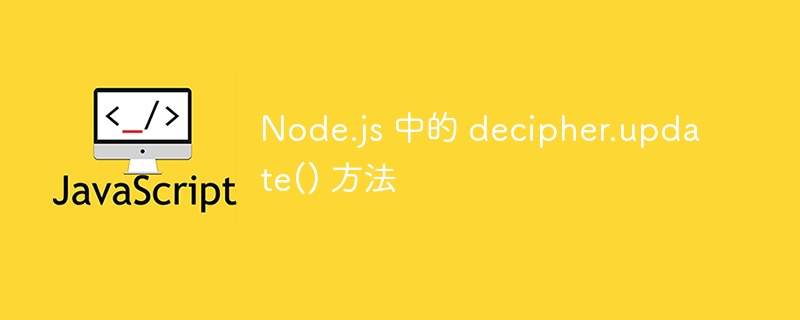

decipher.update() is used to update the decryption with the received data according to the given encoding format. It is one of the built-in methods provided by the Decipher class in the crypto module. If the input encoding is specified, the data parameter is a string, otherwise the data parameter is a buffer
decipher.update(data, [inputEncoding], [outputEncoding])
The above parameters are described as follows-
data – It requires data as input passed to update the decrypted content.
inputEncoding - It takes the input encoding as a parameter. Possible input values are hexadecimal, base64, etc.
outputEncoding – It takes the output encoding as a parameter. The input type of this parameter is string. Possible input values are hexadecimal, base64, etc.
Create a file named decipherUpdate.js and copy the following code snippet. After creating the file, run this code using the following command as shown in the example below -
node decipherUpdate.js
decipherUpdate.js
// Example to demonstrate the use of decipher.final() method
// Importing the crypto module
const crypto = require('crypto');
// Initialising the AES algorithm
const algorithm = 'aes-192-cbc';
// Initialising the password used for generating key
const password = '12345678123456789';
// Retrieving key for the decipher object
const key = crypto.scryptSync(password, 'old data', 24);
// Initializing the static iv
const iv = Buffer.alloc(16, 0);
const decipher = crypto.createDecipheriv(algorithm, key, iv);
// Initializing the decipher object to get decipher
const encrypted = '083bfe1b2f91677e5d00add115be2f1b2e362e190406f5c6b60e86969bf03bff';
// const encrypted2 = '8d11772fce59f08e7558db5bf17b3112';
let decryptedValue = decipher.update(encrypted, 'hex', 'utf8');
// let decryptedValue1 = decipher.update(encrypted1, 'hex', 'utf8');
decryptedValue += decipher.final('utf8');
// Printing the result...
console.log("Decrypted value -- " + decryptedValue);
// console.log("Base64 String:- " + base64Value)C:\homeode>> node decipherUpdate.js Decrypted value -- Some new text data
Let’s look at another example.
// Example to demonstrate the use of decipher.final() method
// Importing the crypto module
const crypto = require('crypto');
// Initialising the AES algorithm
const algorithm = 'aes-192-cbc';
// Initialising the password used for generating key
const password = '12345678123456789';
// Retrieving key for the decipher object
crypto.scrypt(password, 'salt', 24,
{ N: 512 }, (err, key) => {
if (err) throw err;
// Initializing the static iv
const iv = Buffer.alloc(16, 0);
// Initializing the decipher with algo, key and iv
const decipher = crypto.createDecipheriv(algorithm, key, iv);
const encrypted = '91d6d37e70fbae537715f0a921d15152194435b96ce3973d92fbbc4a82071074';
//Getting the decrypted string value
const decrypted = decipher.update(encrypted, 'hex', 'utf8');
// Printing the result...
console.log("Decrypted value:- " + decrypted);
});C:\homeode>> node decipherUpdate.js Decrypted value:- Some new text data
The above is the detailed content of decipher.update() method in Node.js. For more information, please follow other related articles on the PHP Chinese website!




